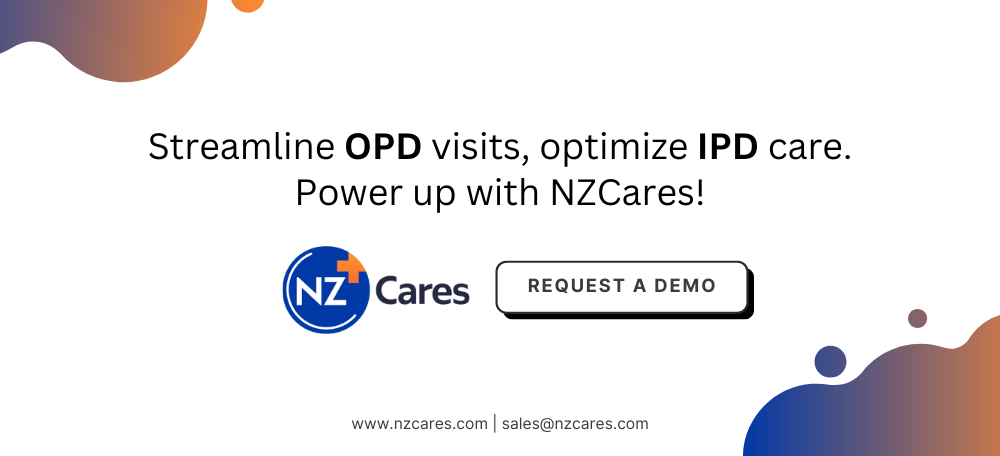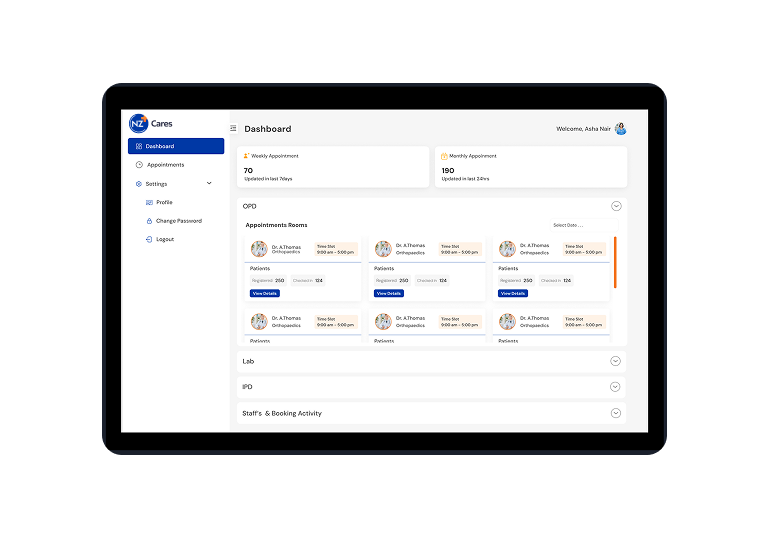What if your hospital could run itself—flawlessly, efficiently, and intelligently? The future of healthcare isn’t coming – it’s already here, powered by Smart Hospital Management Software.
Think of a hospital where you just simply walk in and everything from the moment you schedule an appointment to the time you are given a diagnosis is all organized seamlessly. Sounds dreamlike, huh? Well. The new era in healthcare has arrived with HMS (Hospital Management Software) providing the capability…
Hospitals are now revising their processes and improving patient care provision through smart software that eases the pains of hospital administration. This post looks at HMS, what it is, how it can improve patient care and strengthen medical establishments.
The Digital Revolution in Healthcare
Healthcare is being transformed by digital. There is no more paper, the processing of records is slow and billing works through obsolete methods.
What hospitals are starting to do with new technology like cloud-based systems, AI and automation is provide the means for healthcare to operate more efficiently. Something that makes it nationally accessible and centered around the patient. It is not so much about replacing legacy systems but providing a smarter, more engaged health experience for the good of everybody involved.
The Growing Need for Automation in Hospital Management
Hospitals are big ecosystems, it is a fact. You have to keep tabs on patient data, book appointments, handle billing, and make sure inventory levels and infinite in the hospital. The need for automation has never been more crucial.
>HMS (Hospital Management Systems) are the answer to automate all these redundant tasks so that time can be made available for healthcare pros to deliver patient-centered care.
What is a Hospital Management Software (HMS)?
An HMS is a large software system intended to improve hospital function. Patient registration, appointment scheduling, billing, inventory management, and compliance tracking are all brought under the umbrella of an HMS unifies everything.
It’s the smart assistant that runs a hospital so all they have to do is provide top-notch care to the patients.
How HMS is Transforming Patient Care and Hospital Operations
An HMS improves efficiency in hospital operations as it automates repetitive tasks, increases communication, and offers patients medical data in real time. But it doesn’t end there.
It also enables health care professionals to make wiser, quicker decisions, ultimately better patient results and more satisfied patients.
It’s the smart assistant that runs a hospital so all they have to do is provide top-notch care to the patients.
1. Understanding the Need for a Hospital Management Software
Challenges in Traditional Hospital Management
Hospital operations using the traditional method are similar to putting together a locked puzzle but with parts missing.
-
Manual Patient Records and Inefficient Workflows:
Exhaustive paperwork and a rusted-out system are hectic for the staff of the Hospital. It results in an error, wastage, and failure to catch up on some details. -
Administrative Overload and Excessive Paperwork:
From scheduling appointments to handling billing, administrative tasks can pile up, leading to burnout and inefficiencies. -
Long Wait Times and Scheduling Conflicts:
When you run the system manually, the patients often face annoying delays, long lag times, and double books. -
Billing Errors and Financial Mismanagement:
It is a common issue that costs the industry huge money as well patient’s frustration with bad bills, so some legal implications. -
Poor Communication Between Hospital Departments:
When departments don’t communicate effectively, it can lead to mixed-up diagnoses, missed treatments, and frustrated patients. -
Security Risks and Regulatory Non-Compliance:
Protecting patient data is critical, and traditional systems often fail to comply with stringent regulations, leading to potential security breaches.
How a Hospital Management Software Addresses These Challenges
This is where a Hospital Management System truly proves its worth. By digitizing and automating the most time-consuming and error-prone tasks, an HMS brings order to the chaos. Patient records are securely stored and instantly accessible, appointment scheduling becomes smooth and conflict-free, and billing is accurate and transparent. Staff are no longer buried in paperwork, and departments can finally communicate in real time. So that you can create a more connected, coordinated care environment.
With our Hospital Management System, NZCares, these improvements are not just possibilities—they’re built-in. From smart scheduling to automated compliance tracking, NZCares helps hospitals reduce administrative burden, minimize errors, and enhance the overall patient experience. It’s more than just software—it’s the engine behind a smarter, safer, and more efficient hospital.
2. Key Features of an Effective Hospital Management Software
An effective Hospital Management System isn’t just about going paperless—it’s about reimagining how a hospital functions every single day. It eases the everyday pressure on staff, connects departments effortlessly, and ensures no critical task is overlooked. From handling appointments and patient records to simplifying billing and improving internal communication, a powerful HMS becomes the invisible engine that keeps a hospital running smoothly. This allows caregivers to focus more on their patients, not the paperwork.
That’s exactly what our HMS solution, NZCares, is built for. It’s designed around the real people who keep hospitals going—doctors, nurses, front desk teams, pharmacists, lab technicians, and more. Each user role has access to tools and features that match their daily responsibilities, making collaboration easier and decision-making faster. With NZCares, your hospital doesn’t just go digital—it becomes smarter, more connected, and truly patient-focused.
Let’s break it down:
A. Patient-Centric Features
-
One-Touch Patient Registration & Profile Management:
Gone are the days of filling out endless forms. Patients can register and manage their profiles with just a few clicks. -
Online Appointment Scheduling with Real-Time Updates:
No more long wait times for appointments; patients can book, reschedule, and receive instant updates -
Electronic Health Records (EHR):
With EHR, patient history is always just a click away, ensuring doctors have the right information when they need it. -
Telemedicine & Virtual Consultations:
Patients can consult with Doctors and healthcare providers from the comfort of their homes, saving time and improving access to care. -
AI-Powered Symptom Checker:
The future of diagnosis is here. AI tools can help identify potential health issues based on patient symptoms, making early detection possible.
B. Administrative & Operational Features
-
Automated Billing & Claims Processing:
Billing is a breeze with automated systems that ensure accuracy and faster processing. -
AI-Driven Inventory & Pharmacy Management:
No more running out of critical supplies. AI keeps track of inventory, helping hospitals stay ahead of the game. -
Staff Rostering & Shift Scheduling:
Automated scheduling takes the guesswork out of staffing, ensuring the right team is in place at the right time. -
Regulatory Compliance Tracking:
Staying compliant with HIPAA, GDPR, and other regulations is built into the system, so hospitals avoid costly fines and data breaches. -
Analytics Dashboard:
Data-driven insights help hospitals monitor performance, improve care, and optimize resources.
C. Doctor and Medical Staff Features in hospital management software
-
Personalized Patient Dashboards:
Doctors can track patient progress in real time with a comprehensive dashboard. -
AI-Powered Treatment Recommendations:
AI can suggest treatment options based on the latest research and patient data. -
Digital Notes with Voice Recognition:
Doctors can save time by dictating their notes, making documentation faster and more accurate. -
Integrated Lab & Radiology Reporting:
Test results are instantly available to the entire care team, ensuring that treatments are timely and based on the most up-to-date data.
3. How HMS Benefits Healthcare Institutions
Before HMS, hospitals dealt with long queues, disorganized records, delayed treatments, miscommunication, and stressed-out staff. These issues weren’t just operational—they deeply affected the patient experience and overall outcomes. Implementing an HMS doesn’t just enhance efficiency—it transforms the way care is delivered. And for hospital administrators, it’s a game changer—reducing costs, improving resource allocation, and offering data-driven insights for smarter decisions. So, why should your hospital invest in an HMS? Here’s how it can take your operations to the next level:
-
Increased Operational Efficiency & Reduced Costs:
By automating repetitive tasks, an HMS reduces costs and boosts productivity, allowing staff to focus on patient care. -
Enhanced Patient Satisfaction with Faster Services:
With streamlined scheduling, billing, and medical records, patients experience faster, more efficient service. -
Streamlined Workflows with Automation:
Automation of daily tasks ensures that your hospital runs smoothly, improving both the staff experience and patient care. -
Improved Data Accuracy & Security:
With everything stored digitally, errors and security risks are minimized, and compliance is a breeze. -
Faster Decision-Making with AI-Driven Insights:
AI provides actionable insights, helping healthcare providers make quicker, more informed decisions for better patient outcomes.
4. The Future of Hospital Management Software
Looking ahead, the possibilities for an HMS are endless. Here’s a peek into the future:
-
AI-Driven Predictive Healthcare:
With the help of predictive analytics, healthcare providers can anticipate patient needs before they arise, offering truly proactive care. -
Cloud-Based HMS for Scalability & Remote Access:
Cloud technology allows healthcare providers to access their systems from anywhere, making it ideal for multi-location hospitals.
-
IoT-Enabled Smart Hospitals:
Imagine hospitals where everything from patient vital signs to room temperature is monitored in real-time via IoT devices.. -
Integration with Wearable Health Tech & Telemedicine:
HMS will increasingly integrate with wearables and telemedicine, making it easier for hospitals to offer personalized, continuous care.
Why NZCares is the Smartest and Most Adaptable HMS in the Market
When it comes to choosing an HMS, NZCares stands out as the top choice. Here’s why:
A. Unmatched Customization & Scalability
Extremely flexible and can scale with the needs of your hospital NZCares
Whether you are running a small clinic or a large hospital network, NZCares has a scalable solution for all.
B. Core Modules of NZCares Hospital Management System
The following modules come together in NZCares by strength to create a bundle for complete hospital management;
- OPD – Outpatient Management
- IPD – Inpatient Management
- Pharmacy Management
- Laboratory & Diagnostic Management
- Telemedicine & Virtual Care
- Emergency & Critical Care
- Finance & Billing
- Resource & Facility
- Reporting & Analytics
- Patient Feedback & Engagement
- Clinic Management
C. AI-Driven Smart Automation
NZCares uses AI to reduce diagnostic errors, improve workflows, and amend treatment options.
D. Superior Efficiency & ROI
According to NZCares, NZ-based hospitals that go live on NZCares see significant improvements in the health of staff, patient experience, and financial performance.
E. Seamless Interdepartmental Integration
With NZCares all departments work seamlessly and hence the journey is more coordinated and better for patients.
F. Security & Compliance at Its Core
NZCares has 99% compliance with both HIPAA and GDPR, along with excellent encryption plus role-based access controls.
Choosing the Right HMS: What to Consider
When choosing a Hospital Management System, here’s what to look for:
- Customization: Ensure the system fits your hospital’s specific needs.
- Interoperability: The system should integrate smoothly with existing technologies.
- User-Friendliness: A user-friendly interface makes training easier and adoption smoother.
- Scalability: Look for a system that can grow with your hospital.
- Customer Support: Reliable support ensures you have help when you need it most.
Conclusion
Healthcare is going digital right now, and with a Hospital Management System as smart as NZCares in your hospital you shall never fall behind. The decision to invest in an HMS today also has nothing to do with fashion. It is about a smarter, faster path to deliver exceptional care tomorrow.
You are not just running a hospital with NZCares; you are turning your healthcare facility into a future-ready adaptable powerhouse.
Let’s build a smarter, more connected healthcare system—starting with your hospital.
👉 Contact NZCares for a Demo or visit www.nzcares.com.

